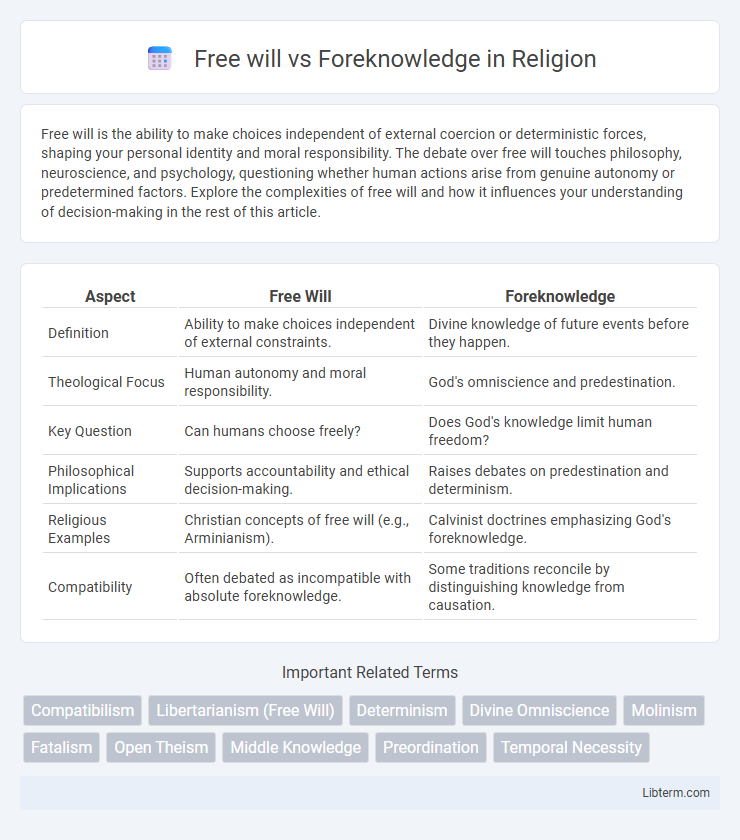Free will is the ability to make choices independent of external coercion or deterministic forces, shaping your personal identity and moral responsibility. The debate over free will touches philosophy, neuroscience, and psychology, questioning whether human actions arise from genuine autonomy or predetermined factors. Explore the complexities of free will and how it influences your understanding of decision-making in the rest of this article.
Table of Comparison
| Aspect | Free Will | Foreknowledge |
|---|---|---|
| Definition | Ability to make choices independent of external constraints. | Divine knowledge of future events before they happen. |
| Theological Focus | Human autonomy and moral responsibility. | God's omniscience and predestination. |
| Key Question | Can humans choose freely? | Does God's knowledge limit human freedom? |
| Philosophical Implications | Supports accountability and ethical decision-making. | Raises debates on predestination and determinism. |
| Religious Examples | Christian concepts of free will (e.g., Arminianism). | Calvinist doctrines emphasizing God's foreknowledge. |
| Compatibility | Often debated as incompatible with absolute foreknowledge. | Some traditions reconcile by distinguishing knowledge from causation. |
Understanding Free Will: Definitions and Perspectives
Free will is commonly defined as the capacity of individuals to make choices unconstrained by external forces or predetermined fate. Philosophical perspectives on free will vary, ranging from libertarianism, which asserts genuine freedom and moral responsibility, to compatibilism, which reconciles free will with determinism by emphasizing internal motivations. Understanding free will involves exploring how conscious decision-making intersects with the concept of foreknowledge, particularly in theological and metaphysical contexts where foreknowledge challenges the notion of human freedom.
The Concept of Divine Foreknowledge
Divine foreknowledge refers to the belief that God possesses complete and infallible knowledge of all events, past, present, and future. This concept raises critical philosophical debates about human free will, as foreknowledge implies that future actions are already known and, potentially, predetermined. The challenge lies in reconciling God's omniscience with genuine human freedom, maintaining that foreknowledge does not necessitate causation or constraint on individual choice.
Historical Roots of the Free Will vs Foreknowledge Debate
The historical roots of the free will vs foreknowledge debate trace back to early philosophical and theological discussions in Ancient Greece and early Christian thought, where figures like Augustine of Hippo explored how God's omniscience coexists with human freedom. Medieval Scholastic philosophers, such as Thomas Aquinas, further developed the discourse by attempting to reconcile divine foreknowledge with libertarian free will, emphasizing God's timeless knowledge without negating human agency. This foundational debate continues to influence contemporary discussions on predestination, determinism, and moral responsibility within both philosophy and theology.
Philosophical Arguments Supporting Free Will
Philosophical arguments supporting free will emphasize the ability of agents to make genuine choices independent of predetermined outcomes, highlighting moral responsibility as a natural consequence of autonomous decision-making. The principle of alternative possibilities asserts that individuals must have the capacity to act differently in identical circumstances to be considered free. Compatibilist philosophers argue that free will and foreknowledge coexist by redefining freedom as acting according to one's desires without external coercion, even if future events are known.
Challenges Posed by Foreknowledge to Human Autonomy
Foreknowledge challenges human autonomy by implying that future actions are predetermined, potentially undermining the concept of free will. If an omniscient being knows every choice a person will make, it raises questions about whether individuals can genuinely exercise independent decision-making. This tension between foreknowledge and autonomy fuels ongoing philosophical debates on determinism, moral responsibility, and the nature of freedom.
Religious Interpretations: Free Will and Predestination
Religious interpretations of free will and foreknowledge often revolve around the tension between human autonomy and divine omniscience, particularly in doctrines of predestination found in Christianity and Islam. Predestination posits that God's foreknowledge of all events, including human choices, coexists with divine sovereignty, raising debates on whether free will can truly exist if outcomes are predetermined. Theological perspectives vary widely, with some emphasizing God's ultimate control and others affirming that humans possess genuine freedom to choose within the framework of divine foreknowledge.
Logic, Time, and the Paradox of Foreknowledge
The paradox of foreknowledge challenges the logical consistency between free will and the ability to know future events with certainty, questioning whether predetermined knowledge negates genuine choice. Time plays a crucial role, as foreknowledge implies a fixed future, conflicting with the concept of temporal openness required for free will. Logical analysis examines whether foreknowledge entails inevitability or if some interpretations allow for free will despite possessing future insights, highlighting tension between determinism and human autonomy.
Modern Science and the Determinism Debate
Modern science, particularly quantum mechanics and neuroscience, challenges classical determinism by revealing probabilistic events and complex brain processes influencing decision-making. Studies in cognitive neuroscience demonstrate how neural activity precedes conscious awareness, raising questions about the existence of free will under deterministic frameworks. The ongoing determinism debate integrates empirical findings with philosophical inquiry to reassess foreknowledge and human agency in an increasingly interconnected scientific paradigm.
Reconciling Free Will with Foreknowledge: Proposed Solutions
Reconciling free will with foreknowledge involves philosophical approaches such as Molinism, which posits middle knowledge allowing God to know potential choices without determining them. Another solution is the concept of timeless knowledge, where foreknowledge exists outside temporal constraints, preserving human autonomy. Compatibilism argues that determinism and free will can coexist, suggesting foreknowledge does not causally constrain human decisions.
Ethical Implications of Free Will and Foreknowledge
The ethical implications of free will and foreknowledge challenge the foundation of moral responsibility, as foreknowledge of actions could imply predestination, undermining accountability. In philosophical ethics, if individuals lack free will due to predetermined outcomes known in advance, holding them morally responsible becomes problematic. This tension influences debates on justice, punishment, and forgiveness by questioning whether actions arise from autonomous choice or inevitable destiny.
Free will Infographic

 libterm.com
libterm.com